- Home
- Scott Turow
Personal injuries kc-5 Page 16
Personal injuries kc-5 Read online
Page 16
Feaver sailed into the conference room a few moments later. When Evon asked how it, had gone, he raised both thumbs in his cabretta gloves, but signaled toward his back, where the recorder was still rolling. One of the protocols Feaver attempted to follow with mixed success was to avoid idle chatter while wired. Even the most innocuous remark could come back to bite him on cross-examination.
"Today we need to talk." Evon promised to explain later.
Robbie said he had simply waved off Skolnick's suggestion to take back the money. There had been a few quarreling gestures between them, but in time Skolnick had succumbed with an elaborate shrug.
She then asked him to stand. "I have to frisk you."
His eyes narrowed with an odd light, veering between disbelief and lechery, but he came to his feet with his arms thrown wide. All yours.
She had frisked men before, of course. Regs didn't favor it. But when you were first to the subject on an arrest, you didn't twiddle your thumbs waiting to see if he'd pull a six-inch switchblade. But she'd never frisked someone she knew. It was strange. As when they'd wrestled, he seemed larger and more solid than she imagined. She squeezed her way up his pants legs, turned out his pockets, and passed as quickly as she could over the crotch. She had a sudden fear he'd try something awful, hold her hand there or boost his hips forward. At that moment, she realized she should have asked Shirley to be here. But Robbie did not react. He had enough stage sense to realize how bad he could make both of them sound on the recording. She was the one who was tense. She turned him around and repeated the procedure from behind. At the end, she searched his briefcase and his overcoat, then described all her findings, before grabbing the remote and turning off the FoxBlte.
"Was it as good for you as it was for me?" he asked then.
"Listen, buster, I nearly said I found absolutely nothing in this boy's trousers."
He clutched his heart but he was smiling. The insinuations, the joking. She knew he felt he had her going his way.
He had figured out by now that the camera had not worked. McManis had asked her to listen immediately to what the FoxBlte had captured and to let them know in the van. Robbie pulled the mike back through his buttonhole and removed his shirt, and happily unhitched the unit. His back was sore from sitting against it. Klecker by then had left instructions with Shirley about how to load the recording magazines in the computer. Shirley, a curlyheaded woman in her late forties, helped, and the three of them listened together. At the critical point, as Feaver and the judge had exchanged their dueling gestures about the envelope, there were a few words-both of them, in fact, said "Come on"-but nothing clearly indicated what had become of the money. The only direct proof that Skolnick had accepted would be Robbie's word. From the start, Sennett had known that an admitted felon against a judge was a losing contest before most juries.
"Figures," said McManis, when Evon called him. "Everything that can go wrong will." He asked to speak to Bobbie so he could tell him he'd done a great job.
Afterwards, Feaver, who'd draped his shirt unbuttoned around himself, took it off again and asked for Evon's help removing the FoxBIte harness. It had been secured with yards of tape circling his abdomen.
"Pull the tape fast," he told her. "It's going to hurt like a bastard." He was right about that. Unruly black hair stretched densely over his upper body, gathering to the thickness of a pelt across his chest and down the medial line of his stomach. He looked like a lemur or something else you might want to pet. Klecker had suggested shaving, but McManis said no, it could lead to too many questions at the haberdasher's, or the doctor's office, or the locker room of the health club where Robbie still appeared occasionally on weekends.
"I lived my life pulling off adhesive tape," she told him. She cut through it with scissors, then peeled back the ends, making an opening right over his hipbones where the flesh became soft. She was standing inches from him, close enough to take in all his cosmetic scents and his body heat and his size, the coarse feel of all that hair on his upper body. Beautiful people-women and men-knew it. Pride, a sense of attention, and confidence in his effect radiated off Robbie Feaver at all times. With him half-unclothed, it was as if some lead vest containing that emanation had been removed.
"Ready?" she asked.
He put his hands on her shoulders to brace himself. "Tell me you're not going to enjoy this."
"Mommy brought me up not to lie. Hold tight." She squared her knees against his for leverage. There was a pulse of something at that moment. Perhaps he shuddered, or his grip on her shoulders tightened. It lasted only a second and she avoided his eye. Then she pulled off the front layers with a single heave, amazed by the vigor, the sheer wildness of the laughter that raced through her as he emitted a half-stifled outcry of pain.
CHAPTER 16
Having promised D.C. a judge and having failed to deliver Skolnick, Sennett turned his attention to Silvio Malatesta. Stan told us he had proposed bugging Malatesta's chambers, but Judge Winchell would not approve an overhear that risked prolonged eavesdropping on innocent judicial functions. She wanted proof, just as she'd had before the camera went into Skolnick's car, that a specific criminal incident was about to take place.
Thus, the only way to get direct evidence against Malatesta was if Robbie had a wired encounter with the judge. Outside court, Feaver had never had a conversation with Silvio Malatesta that lasted longer than thirty seconds, and he regarded the idea as far-fetched. But Sennett felt that without a judge, D.C. could pull the plug within a few weeks, at the next review. The case against Walter was solid, but there was no certainty he'd roll on Malatesta. If not, there wouldn't be enough evidence against the judge to charge him if the Project was cut short. Therefore, Sennett reasoned, it was better to send Robbie in against Silvio now. McManis reluctantly agreed, even though Feaver continued to predict it would be fruitless.
Amari began round-the-clock surveillance on Malatesta, but it showed that the opportunities for a chance meeting between Feaver and the judge were limited. Aside from work, Malatesta seldom left home without his wife on his arm, a miniature human being four foot eight or nine, who minced along on huge high heels. Amari referred to her as 'Minnie Mouse,' and Minnie Mouse was omnipresent. She was with her husband when they went to church, when they visited their daughter and her children, when they attended concerts at the symphony. Minnie was a harpist and Judge Malatesta was observed hauling her instrument to and from their ancient station wagon several times a week. Most evenings, he accompanied her to her performances at weddings or other large events where her gentle playing was usually lost in the clatter of china and voices. Silvio sat unobtrusively, studying briefs and memos and applauding demurely at the end of every selection.
After a week, Amari concluded the one moment to accost the judge was when he taught. Now an adjunct professor at Blackstone Law School, where he'd previously been full-time, Malatesta continued to meet a single Torts class. Each Tuesday and Thursday at noon, he trudged the two blocks from the courthouse to Blackstone's seventy year-old building. Head lowered as he recited today's presentation in his mind, he passed beneath the law school's elaborate concrete facade into the interior of dark oak. Outside his classroom, Amari said, Malatesta invariably observed the habit of many older gentlemen and took a moment in the rest room. And it was there Robbie would get his chance. In order to prevent intrusions, Klecker would play the role of janitor, barricading the entrance with the little yellow plastic signs used by Blackstone's regular service, whose crews actually visited each day at 4 p.m. Klecker was certain no one would think much of somebody swabbing the floor in the john. There were a hundred ways this could fail, especially if another person followed Malatesta in, but the risks were viewed as tolerable. If questioned, Alf would answer in Polish and go on his way, while Robbie made small talk with the judge.
I have mused now and then on the ubiquitousness of men's rooms in public corruption prosecutions. From the time I entered the so-called white-collar practice,
where bribery cases are a staple, there was at least one case a year where some matter of consequence took place in the john. Why two fellows would choose to pass cash as they stand at the urinal has continued to puzzle me. Because they have only one free hand and no one can reach for a gun? Because they are, so to speak, exposed? Because all know this is truly dirty business? There must be something deeply symbolic. Whatever the reason, it happens with sufficient frequency that a bribe case which is largely hopeless for the defendant is routinely shorthanded as `folding money in the men's room.' Jurors are inevitably unwilling to believe the parties were up to anything good.
So at 11:30 a.m. on Thursday, March 18, Robbie was wired and marched off to Blackstone. He had gone to law school there and, if need be, would explain his presence as related to alumni activity. Evon was along as a witness, again to corroborate that Malatesta was the only other person to have gone in and out of the facility and, accordingly, that his was the other voice on the recording.
Feaver came to a standstill as they entered Blackstone's Gothic front hall. There were fusty odors of floor wax and deteriorating plumbing, and he surveyed the surroundings right up to the ribs of the buttressed arches. He hadn't been back, he told her, in years.
"Bad memories?"
"Sort of. I didn't care to run into the old dean. He'd have had heart failure if he knew I was actually practicing law."
"Why else did he think you went to law school?"
"Oh, he knew that's why I came. But by the time I left he'd caught my routine. He wouldn't have been my top reference for Bar Admissions." Robbie, as usual, was amused by his past antics.
In a moment, he'd entered the men's room, where the plan called for him to lock himself in a stall. Evon took a seat on an oak bench with a good view, and Alf, faintly whistling a Chopin polonaise, appeared less than a minute later with his bucket and his sign. He held the door half open as a successful inducement to get the one other occupant on his way.
At 12:05, Malatesta showed up in his overcoat, which, like all his clothing, seemed slightly too large. He stopped in his tracks when he saw Alf and his sign, but Klecker bestowed a bountiful wave and Malatesta entered, smiling in humble gratitude.
Outside with the earpiece, Evon could hear the stall door open and Robbie's shoes scraping on the tiles. The script called for him to place himself at one of the urinals. There was no mistaking the sound of his lowering fly. Malatesta arrived beside Robbie, quietly humming some musical theme, perhaps the one he'd overheard from Alf.
"Judge, hey," Robbie said. "Robbie Feaver."
"Oh yes, Mr. Feaver. Nice to see you. Very nice to see you.
Robbie apologized for not offering his hand. A laugh, somewhat stillborn, emerged from Malatesta, who was predictably shy of bathroom humor. Robbie asked what brought the judge around and Malatesta offered a thumbnail of the cases he was teaching today on assumption of risk.
That Ettlinger," Robbie said. "That's a half-ass decision.”
"Well, it's somewhat more interesting than that," said Malatesta.
"I mean for a plaintiff. It's bad."
"Well, yes," said the judge. The cloacal waterfall roared. Feaver had been instructed by Kiecker not to attempt anything of significance before then, the apparent lesson of sad prior experience with this environment. Now Robbie's voice dropped.
"Say, Judge," Robbie said, "that Petros case. Thanks. Okay? That was a great ruling. We got a terrific settlement."
There ensued a silence of frightening length. Malatesta, Robbie later reported, was plainly startled. He reached up to touch the black temple of his glasses. Given Silvio's caution and the limited chances for success, the scenario did not call for Robbie to make any brash declarations. He was to cut things short at once if Malatesta veered toward anything overtly defensive. From Feaver's stillness it was plain to Evon he was already afraid he'd overstepped. She heard him padding along and water running in the sink. Afterwards, over the wrinkling of a paper towel, Malatesta unexpectedly spoke.
"I really should thank you, Mr. Feaver." This time Robbie lost a beat.
"That's okay, Judge. My pleasure. Really. I've got a lot Df respect for you, Judge. I just want you to know that I appreciate what you do."
"It showed, Robbie."
"I tried."
"Your papers were excellent. Excellent. Most lawyers, frankly, don't show that kind of respect for the court. I regret to say that not all are as resourceful. You were thoroughly researched. The lawyers in my court so seldom use an out-of-state or federal citation, especially one of any precedential currency. That was helpful to you. Very difficult issue, too. But you convinced me you had the stronger hand. No telling if the Appellate Court would have agreed. We'd both be holding our breaths. You know, out of law school, I clerked in the U.S. District Court for Judge Hamm and he always said to me, "The lawyers think they're getting reversed. They think they've lost. But it's my name on the opinion. I'm the one they say made a mistake."' Malatesta laughed mildly, recalling this wisdom. "He'd tell me I should be pleased to hear you settled."
Robbie, at a loss throughout the conversation, stumbled again. "Didn't you know?"
"Did I? Perhaps it slipped my mind." The revolving lid of a trash bin banged. "But I'm sure it was a good idea. Better that way for everyone. Right? Naturally. The parties want an outcome they can live with, not their names in a casebook. Of course, I'll always have a grain of curiosity about what the Appellate Court would have said. But I suppose we can just move on to the next one. We know, correct?" Malatesta coughed up another thin laugh and the scuffing of his shoes drifted farther away. "See you in court," Malatesta called. "I hope I find the next one as interesting."
"It will be."
When Evon saw Malatesta emerge, he seemed to be smiling. He had his overcoat folded over his arm and started into the large, tiered classroom. Two students greeted him with questions as he was on his way down.
"Jesus," Robbie said as soon as McManis stopped the FoxBlte, back in the office. "What a wacko! This guy is one bubble left of level. One minute he's right with me and then-" Robbie made a whooshing sound and shot his hand into space.
I had been summoned as soon as Feaver returned.
Klecker had finished the dupe, and fast-forwarded to the rest room encounter when Sennett arrived.
"Very clever," said Sennett after it was played. He was beaming. "Very clever. He got his message across. He said his thank-yous. I loved the line about your papers being excellent. The fifties and hundreds especially."
Several of the UCAs who'd crowded into the conference room chortled.
"And the federal currency," said Evon. Nobody else had caught that line and Alf rolled the recording back to play that part again. Robbie had moved a little and the words were somewhat obscured. But we all heard them now.
"What a fox," Sennett said. "I love the visitor-from-another-planet routine. But we've got him. I enjoyed the warning about steering clear of anything that can cause trouble in the Appellate Court." Stan avoided `I told you o,' but it bristled off him anyway.
McManis directed a look toward me. This was less than the clean head shot Stan imagined. Malatesta's defense lawyer would say it was no more than a discussion about i case. Why the wistfulness about the Appellate Court if Malatesta was acknowledging a bribe? And if he'd been paid off, he would have known the case had settled. But Stan had some evidence now, particularly if he could first get a jury to regard Malatesta as crazy-cautious. The sly remarks would take on shape then.
"We need more," McManis said suddenly. It was pointed is Jim had ever been. The struggles between Stan and him were growing more overt daily. Sennett took McManis's measure starkly, but, with reflection, managed a nod.
"We do," Stan said. "And we'll get more. We have to keep working cases in front of Malatesta. But we've got him talking now. To Robbie. And I may be able to pitch Moira again with this." Sennett allowed a little more of the flush of victory into his smile. "But we're going the right way, Jim. Aren'
t we? You have to admit that. D.C. will see it."
McManis answered only with a sidewards nod. It was the first occasion I could recall when he'd been something other than gracious. Instead he looked away from Sennett, and complimented the agents and Robbie on their work.
CHAPTER 17
"We have a problem." It was late in the day, close to 4 p.m. on March 22, the Monday after Bobbie's law school encounter with Malatesta. On the phone, Sennett was in imperial mode. He did not say his name, but simply directed me to meet him at Jim's in ten minutes. Arriving, I found McManis and Aif Klecker with Sennett in the conference room, each of their faces slackened and grave. Stan was in his well-pressed blue suit and the grip of his public persona, jaw prominent, very much in command. He circled a finger and Alf opened more of the red oak cabinetry to reveal a large reel-to-reel tape recorder, a stainless steel Grundig that began turning at once.
The sounds took a moment to identify. There was paper crinkling with an odd distinctness, the chuffing of various items being pushed about close to the microphone. Something clunked down with an impact like a log.
I asked Klecker if this was an `overhear,' the feds' delicate term for a bug.
"The mike's in the desk phone. Sound comes right here over the existing lines." Alf smiled with innocent pride, until Sennett swiveled about and burned him with a look for violating the strictures of need-to-know.
There were now voices, both female. From a distance, someone was talking to the nearer woman about the interminable length of a cross-examination.
"Anyone you recognize?" Sennett asked.
I didn't.
"I'll give you a clue," he said. "Two years ahead of us in law school." Nothing struck me until the distant voice addressed the first woman as `Judge.'
Magda Medzyk! Magda had had a lengthy career in the Prosecuting Attorney's Office, supervising appeals, then had gone on the bench. She was a stolid, frizzy-haired spinster, one of those folks who seemed to have reached middle age even in her law school days. Her wardrobe had never changed, her suits always heavy enough to appear armor-plated, guarding a figure of matronly proportions. I asked Stan where she was sitting currently.

 Testimony
Testimony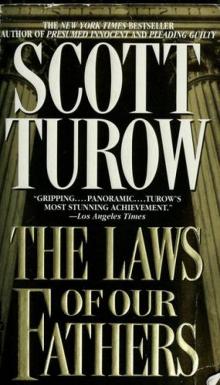 The Laws of Our Fathers
The Laws of Our Fathers Ordinary Heroes
Ordinary Heroes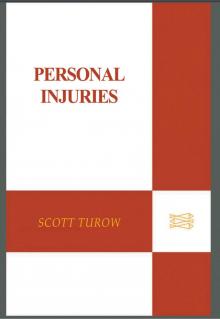 Personal Injuries
Personal Injuries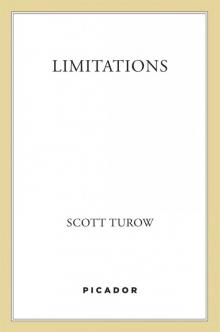 Limitations
Limitations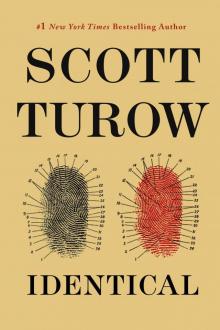 Identical
Identical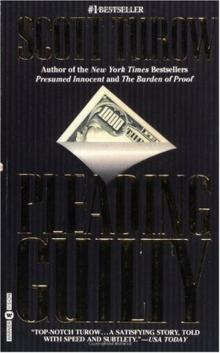 Pleading Guilty
Pleading Guilty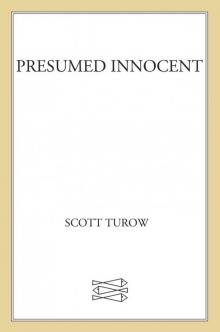 Presumed Innocent
Presumed Innocent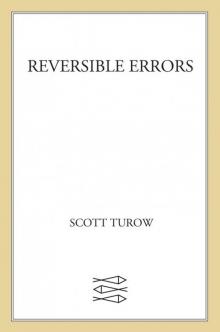 Reversible Errors
Reversible Errors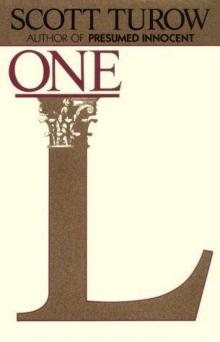 One L: The Turbulent True Story of a First Year at Harvard Law School
One L: The Turbulent True Story of a First Year at Harvard Law School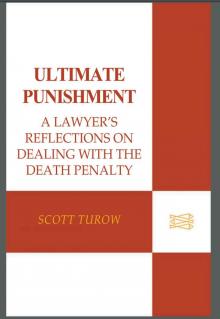 Ultimate Punishment
Ultimate Punishment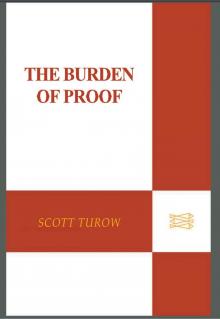 The Burden of Proof
The Burden of Proof Ordinary Heroes (2005)
Ordinary Heroes (2005)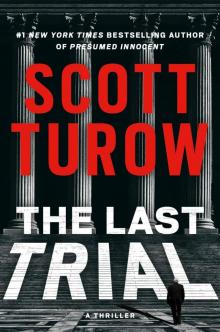 The Last Trial
The Last Trial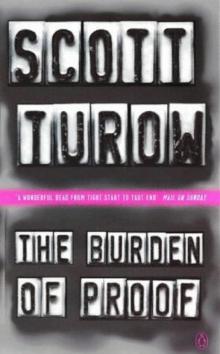 The Burden of Proof kc-2
The Burden of Proof kc-2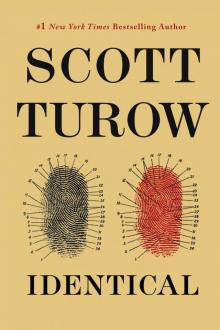 KC09 - Identical
KC09 - Identical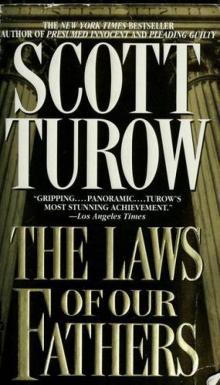 The Laws of our Fathers kc-4
The Laws of our Fathers kc-4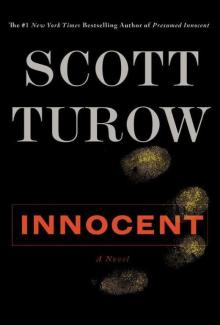 Innocent kc-8
Innocent kc-8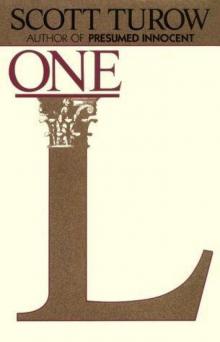 One L
One L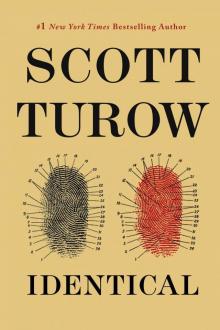 Identical kc-9
Identical kc-9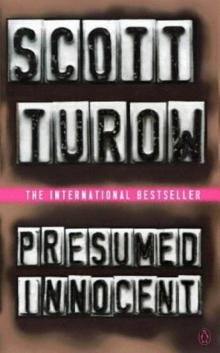 Presumed innocent kc-1
Presumed innocent kc-1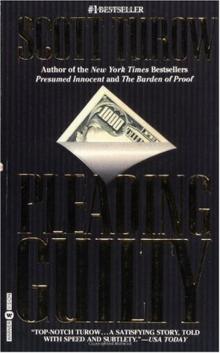 Pleading Guilty kc-3
Pleading Guilty kc-3 One L (1977)
One L (1977)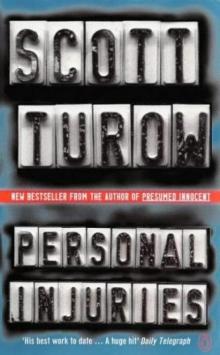 Personal injuries kc-5
Personal injuries kc-5